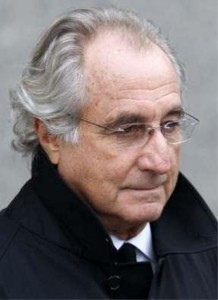NEW YORK, (Reuters) – Bernard Madoff, accused of an “unprecedented” $50 billion financial swindle, was charged yesterday with 11 criminal counts that could put him in prison for the rest of his life.

Madoff, 70, a former Nasdaq stock market chairman and money manager, is expected to plead guilty on Thursday, his lawyer said.
U.S. prosecutors provided new details of the alleged fraud in court papers, saying Madoff’s crime spree lasted from “at least” the 1980s.
The government said in court documents it wants Madoff to forfeit all of the money and property that can be traced back to the alleged fraud — a sum it estimated at more than $170.8 billion. Prosecutors did not say how they arrived at that figure.
They said the investigation is continuing. No one else has been charged since Madoff was arrested three months ago.
“The charges reflect an extraordinary array of crimes committed by Bernard Madoff for over 20 years,” Acting U.S. Attorney Lev Dassin in Manhattan said. “While the alleged crimes are not novel, the size and scope of Mr. Madoff’s fraud are unprecedented.”
Madoff was charged with securities fraud, mail fraud, wire fraud, three counts of money laundering, making false statements and perjury among other charges, according to the court documents. He faces up to 150 years imprisonment, according to sentencing guidelines.
There is no plea agreement with Madoff, who remains under house arrest. He returned to his Manhattan penthouse apartment after a court hearing where prosecutors announced expanded charges against him.
When defendants agree to plead guilty, they often reach a plea bargain, only admitting guilt on some of the charges in exchange for their cooperation. In this case, however, Madoff is expected to plead guilty to all 11 counts at his next court appearance tomorrow, his lawyer said. The government may then ask the judge to jail him until he is sentenced.
Prosecutors have said Madoff confessed in December to running a massive Ponzi scheme — a fraud in which early investors are paid with the money of new clients. The purported swindle operated for decades, offering amazingly consistent returns of between 10 percent and 12 percent, but collapsed in last year’s market meltdown.
In court papers, prosecutors contended Madoff hired numerous employees “with little or no prior pertinent training or experience in the securities industry” to communicate with his investment clients and “generate false and fraudulent documents.”
They said Madoff’s investment business had about 4,800 client accounts as of Nov. 30. 2008, and issued statements for that month reporting that client accounts held a total balance of about $64.8 billion.
In reality, the company “held only a small fraction” of that balance for clients.
At the hearing, the gray-haired Madoff rested his fingertips lightly on the table. His voice was soft but steady as he uttered his first sentences in court since his Dec. 11 arrest.
He looked straight ahead or straight down as he sat with his lawyers, and was slightly stooped as he stood to answer the judge’s questions. He mostly answered “yes” or “no” at the proceeding, in which the judge asked him about potential conflicts involving his lawyer.
Madoff told U.S. District Judge Denny Chin that he was happy with his lawyer, Ira Lee Sorkin. The judge ruled that there was no reason to bar Sorkin from the case.
Madoff said he had never been under the care of a psychiatrist, nor had he taken any alcohol or drugs in the last 24 hours.
Sorkin declined later to comment on his client’s mental and physical health.
Asked by reporters if Madoff will explain his actions, Sorkin said: “At the appropriate time, he will speak. He will speak when he is asked questions by the judge.”
Assistant U.S. Attorney Marc Litt, the chief prosecutor in the case, told the judge that Madoff could face up to 150 years in prison under federal sentencing guidelines. If Madoff pleads guilty, as expected, the judge said he would sentence Madoff in several months.





